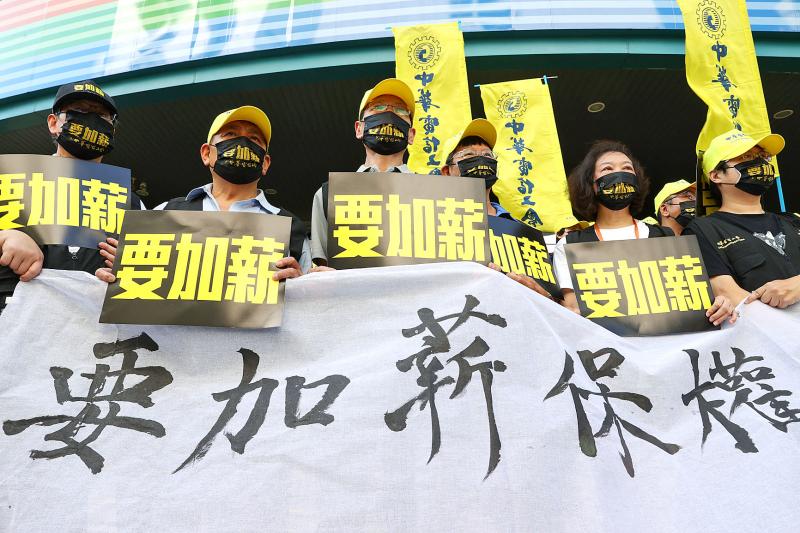Chunghwa Telecom Co (中華電信) workers yesterday protested over chronic labor disputes, called for increased pay and expressed opposition to a restructuring plan.
Workers yesterday protested in front of Chunghwa Telecom’s headquarters in Taipei’s Zhongzheng District (中正), saying that among the key issues was the company’s inaction on a call for a pay increase of NT$5,000 per month, or about 8 percent, amid rising inflation.
The union’s salary raise proposal was not even on the agenda of the company’s extraordinary board meeting yesterday, protest leaders said.

Photo: CNA
Workers said that they are being unfairly treated with stagnant salaries, despite the telecom posting a strong profit last year.
“The company failed to positively respond to the union’s requests during the negotiations, which aimed to settle differences over labor interests and working conditions,” Chunghwa Telecom Workers’ Union chairman Horng Show-long (洪秀龍) told reporters on the sidelines of the protest.
“Our salaries are lower than our expectations and we now are forced to stand up to safeguard our interests and labor rights,” Horng said.
Chunghwa Telecom has a workforce of about 22,000 people, with their monthly salary averaging about NT$60,000.
All of its employees are part of the union.
The union also demanded that any restructuring and transformation plan the company has be fully discussed before it is implemented.
Chunghwa Telecom said it is willing to communicate with the union over pay raises and labor disputes.
It also plans to overhaul its organization and aims to resolve its differences with employees, the company said in a statement.
The union said that it has not set a timetable for a strike, as it hopes the disputes can be solved through negotiation.

South Korea’s equity benchmark yesterday crossed a new milestone just a month after surpassing the once-unthinkable 5,000 mark as surging global memory demand powers the country’s biggest chipmakers. The KOSPI advanced as much as 2.6 percent to a record 6,123, with Samsung Electronics Co and SK Hynix Inc each gaining more than 2 percent. With the benchmark now up 45 percent this year, South Korea’s stock market capitalization has also moved past France’s, following last month’s overtaking of Germany’s. Long overlooked by foreign funds, despite being undervalued, South Korean stocks have now emerged as clear winners in the global market. The so-called “artificial intelligence

‘SEISMIC SHIFT’: The researcher forecast there would be about 1.1 billion mobile shipments this year, down from 1.26 billion the prior year and erasing years of gains The global smartphone market is expected to contract 12.9 percent this year due to the unprecedented memorychip shortage, marking “a crisis like no other,” researcher International Data Corp (IDC) said. The new forecast, a dramatic revision down from earlier estimates, gives the latest accounting of the ongoing memory crunch that is affecting every corner of the electronics industry. The demand for advanced memory to power artificial intelligence (AI) tasks has drained global supply until well into next year and jeopardizes the business model of many smartphone makers. IDC forecast about 1.1 billion mobile shipments this year, down from 1.26 billion the prior

Chinese artificial intelligence (AI) start-up DeepSeek’s (深度求索) latest AI model, set to be released as soon as next week, was trained on Nvidia Corp’s most advanced AI chip, the Blackwell, a senior official of US President Donald Trump’s administration said on Monday, in what could represent a violation of US export controls. The US believes DeepSeek will remove the technical indicators that might reveal its use of American AI chips, the official said, adding that the Blackwells are likely clustered at its data center in Inner Mongolia, an autonomous region of China. The person declined to say how the US government received

People stand in a Pokemon store in Tokyo on Thursday. One of the world highest-grossing franchises is celebrated its 30th anniversary yesterday.